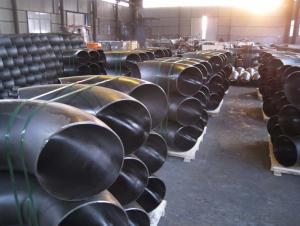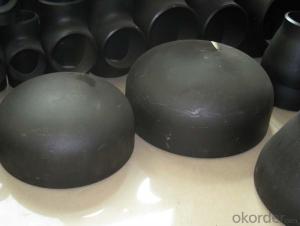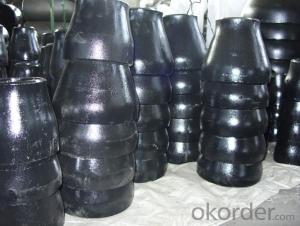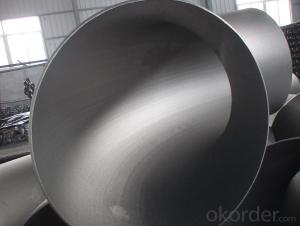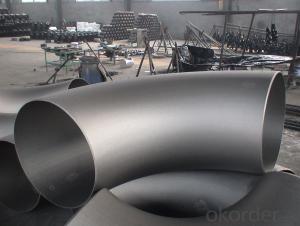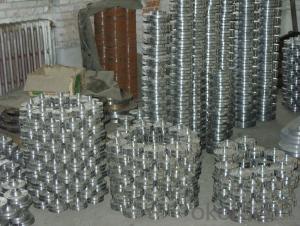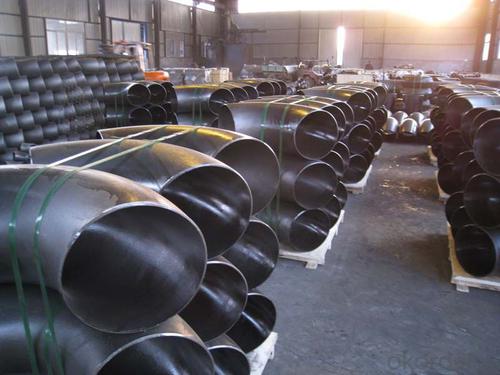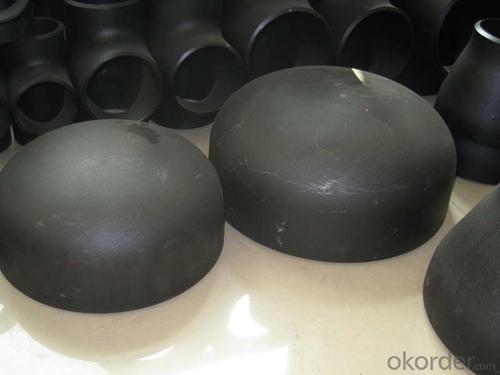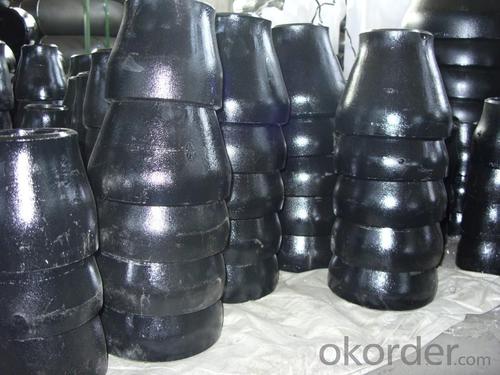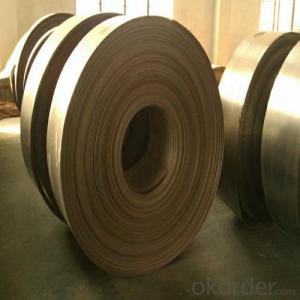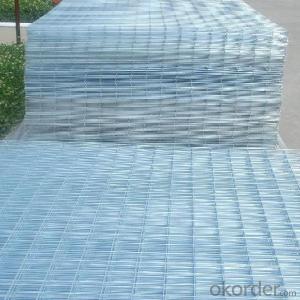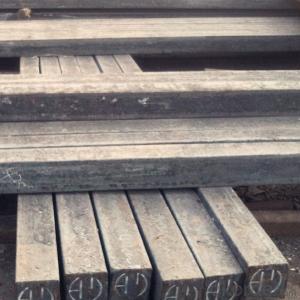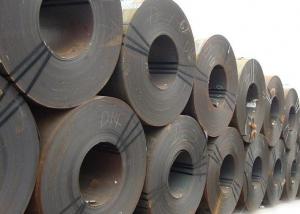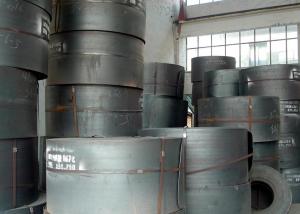Carbon Steel Pipe Fittings SA105 BEND TEE
- Loading Port:
- China Main Port
- Payment Terms:
- TT OR LC
- Min Order Qty:
- -
- Supply Capability:
- -
OKorder Service Pledge
OKorder Financial Service
You Might Also Like
Specifications
pipe fitting elbow
Certificate:ISO:9001-2000
New material,completely meet asme and din standard
Best price
1. type: AISI ASTM A234 WPB BW Con Elbow
2. Size: 1/2"-48"(1/2"-24"is seamless and 26"-48"is welded)
3. Wall thickness: sch10-160, STD, XS, XXS
4. Material: A234WPB, A420WPL6, A420WP5, WP11, WP12, WP22, etc
5. Welding line: seamless
6. Angle of bend: 30, 45, 90, 180degree
7. Bending radius: SR, LR
8. Standard: ANSI B16.9, JIS, SB, DIN, GB
9. Surface treatment: black paint, vanis paint, black rust-proof oil,
transparent oil, hot galvanizing
10. Application: petroleum, electricity, chemical, natural gas, metallurgy,construction,
shipbuilding and other fields because of its high pressure, high temperature, etc
11. connection: welding
12. technics:forged
13.Certificate:ISO9001 - 2000, CE, SGS, etc.
14. packaging: wooden case, pallet, container or in accordance with the
requirement of customers
15. Principle: quality fist, customer first, credit first
16. payment: L/C T/T
17. delivery time: 7-25 days after payments
18. Notes: the bevel can be made in accordance with the special requirements
of the customers
19. Others: we can also produce the products according to the requirements
of the customers
The main production:
1. PIPE FITTINGS: elbows, tees, bends, reducers, cap, flanges and sockets etc.
2. PIPE: bult welded pipes, seamless pipes, threaded pipes, etc.
We sincerely welcom customers at home and abroad to visit us and seek common development.
- Q: What are the different types of steel sheets and their applications?
- There are several different types of steel sheets, each with their own unique properties and applications. Some common types include cold rolled steel sheets, hot rolled steel sheets, galvanized steel sheets, and stainless steel sheets. Cold rolled steel sheets are known for their smooth finish and high strength, making them ideal for applications such as automotive parts, appliances, and construction materials. Hot rolled steel sheets are less smooth but have a higher tolerance for shaping and bending, making them suitable for structural components, machinery, and pipe manufacturing. Galvanized steel sheets are coated with a layer of zinc to protect against corrosion, making them commonly used in outdoor structures, roofing, and automotive body parts. Stainless steel sheets are highly resistant to corrosion and staining, making them popular in applications such as kitchen equipment, medical instruments, and architectural features. Overall, the choice of steel sheet type depends on the specific requirements of the application, including strength, durability, corrosion resistance, and desired aesthetic.
- Q: What are the different types of steel pipes and tubes?
- There are several different types of steel pipes and tubes, including seamless pipes, welded pipes, galvanized pipes, stainless steel pipes, and structural tubes.
- Q: How is steel wire rope strength tested?
- Steel wire rope strength is typically tested using a destructive testing method called tensile testing. During this process, a sample of the steel wire rope is subjected to increasing amounts of tension until it reaches its breaking point. The force required to break the rope is measured, and this provides an accurate measurement of its strength.
- Q: What are the common types of steel products used in the telecommunications industry?
- The common types of steel products used in the telecommunications industry include steel towers, steel poles, and steel cables. These products are essential for supporting antennas, transmitting signals, and providing stability to telecommunications infrastructure.
- Q: What are the safety precautions to be followed when handling steel products?
- When handling steel products, there are several safety precautions that should be followed. Firstly, it is important to wear appropriate personal protective equipment (PPE) such as gloves, safety glasses, and steel-toed boots to protect against cuts, abrasions, and impact injuries. Additionally, workers should be trained on proper lifting techniques to prevent strains and back injuries when handling heavy steel objects. It is crucial to maintain a clean and organized work area to prevent tripping hazards and to properly store steel products to prevent them from falling or causing injuries. Finally, regular inspections and maintenance of equipment and tools should be conducted to ensure they are in proper working condition, reducing the risk of accidents.
- Q: How is steel tubing used in the oil and gas industry?
- Steel tubing is commonly used in the oil and gas industry for various applications such as drilling, production, and transportation of oil and gas. It is used for casing and tubing in oil wells to provide structural support and prevent collapse. Steel tubing is also utilized in pipelines to transport oil and gas over long distances, as it offers high strength, durability, and resistance to harsh environments. Additionally, steel tubing is used in the manufacturing of equipment and machinery used in the extraction and refining processes of oil and gas.
- Q: What are the different types of steel products used in the manufacturing of consumer goods?
- There are various types of steel products used in the manufacturing of consumer goods, including stainless steel, carbon steel, alloy steel, and tool steel. Stainless steel is commonly used for kitchen appliances and cutlery due to its corrosion resistance properties. Carbon steel is used in the production of items like automotive parts and household tools. Alloy steel, which is a combination of different metals, is often used in the manufacturing of consumer goods that require high strength and durability, such as bicycles or furniture. Tool steel is specifically designed for making tools and is used for items like drill bits, screwdrivers, and wrenches.
- Q: How is steel tubing manufactured?
- Steel tubing is manufactured through a process called tube making, which involves several steps. Initially, a solid steel billet is heated and pierced to form a hollow tube. This tube is then elongated and reduced in diameter using a series of rollers, resulting in a thin-walled tube. Further processing, such as straightening, cutting, and bending, may be done to achieve the desired shape and dimensions. The final product is then subjected to various finishing treatments, including heat treatment, coating, and inspection, to ensure its quality and durability.
- Q: What are the different types of steel tanks and their applications?
- There are various types of steel tanks used in different applications. Some common types include: 1. Carbon Steel Tanks: These tanks are made of carbon steel and are suitable for storing non-corrosive liquids, such as water, chemicals, and fuel. 2. Stainless Steel Tanks: These tanks are made of stainless steel, which provides excellent resistance to corrosion. They are commonly used for storing corrosive substances, such as acids, solvents, and pharmaceutical products. 3. Galvanized Steel Tanks: These tanks are coated with a layer of zinc to prevent corrosion. They are ideal for storing water, fertilizers, and other non-corrosive liquids. 4. Double-Walled Steel Tanks: These tanks consist of an inner and outer wall, with an air gap in between. They are used for storing hazardous materials to provide an extra layer of protection against leaks and spills. 5. Underground Steel Tanks: These tanks are designed to be buried underground and are commonly used for storing fuel, such as gasoline or diesel, at gas stations or for residential heating. 6. Elevated Steel Tanks: These tanks are raised above the ground on a support structure and are used for storing water in areas with low water pressure or for firefighting purposes. Each type of steel tank has its own specific applications and benefits, and the choice depends on the nature of the stored substance and the intended use.
- Q: How is steel plate formed into complex shapes?
- Steel plate can be formed into complex shapes through various processes such as hot rolling, cold rolling, pressing, or bending. These methods involve applying heat or pressure to the steel plate, allowing it to be molded into the desired shape. Additionally, techniques like laser cutting or CNC machining can be used to precisely cut and shape the steel plate into intricate designs.
Send your message to us
Carbon Steel Pipe Fittings SA105 BEND TEE
- Loading Port:
- China Main Port
- Payment Terms:
- TT OR LC
- Min Order Qty:
- -
- Supply Capability:
- -
OKorder Service Pledge
OKorder Financial Service
Similar products
Hot products
Hot Searches
Related keywords
